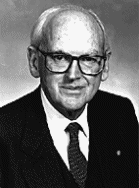History – THE RT HON SIR HARRY GIBBS GCMG AC KBE

The Rt Hon Sir Harry Talbot Gibbs gave long and distinguished service to the nation in many fields: as a barrister; a member of the armed services; a member of the University of Queensland Faculty of Law; a judge of the Supreme Court of Queensland, of the Federal Court of Bankruptcy, and of the Supreme Court of the Australian Capital Territory; and as a Justice of the High Court and ultimately as Chief Justice of Australia.
Born in Sydney in 1917, Sir Harry was educated at the Ipswich Grammar School and the University of Queensland. He graduated with the degrees of BA and LLB, both with first class honours and was admitted to the Queensland Bar in 1939.
Sir Harry served in the army during the Second World War from 1939 to 1945. He was mentioned in dispatches.
Once demobilised, Sir Harry resumed his practice at the Bar. Returning to study, Sir Harry was awarded the degree of LLM in 1946. He tool silk in 1957. Sir Harry was appointed to the Supreme Court of Queensland in 1961. In 1967 he became a Judge of the Federal Court of Bankruptcy and the Supreme Court of the Australia Territory.
Sir Harry was a member of the Faculty of Law, University of Queensland from 1954 to 1967, lecturing in evidence and property law. Subsequently he was awarded the degrees of LLD from the University of Queensland and Hon D Univ from Griffith University, and was made an honorary Bencher of Lincoln’s Inn.
In 1970 Sir Harry was appointed to the High Court of Australia. He served with distinction as a justice of that court, and as Chief Justice from 1981 to 1987.
After retiring from that office Sir Harry presided over a number of commissions of enquiry including as Chairman of the Review of the Commonwealth Criminal Law. He held a commission as Judge of the Court of Appeal of Kirribati.
Sir Harry’s judicial eminence was such that Lord Denning could write of him, “his work as Chief Justice was of the first quality and I would rank him as one of the greatest of your Chief Justices rivalling even my good friend Sir Owen Dixon”.
Those who appeared before Sir Harry were never in any doubt of his towering intellect and legal acumen. Such gifts were to be expected of one who had reached the pinnacle of his profession. What was perhaps surprising in such circumstances was the unfailing courtesy and reasonableness with which he dealt with those whose submissions and out of Court conversation he might well have regarded as lacking in intellectual rigour.
It has been said of Sir Harry that “simple truth is Sir Harry’s utmost skill. It is one of Sir Harry’s great achievements to utter simple truth is in a way that makes them seem blindingly obvious although they were not so before he uttered them.”
In 1990, Sir Harry became the second chairman of the Board of Governors of the Australian Tax Research Foundation, replacing Sir Hermann Black. In taking on that position he observed:
“The structure of the system of taxation has a significance which goes far beyond the mere raising of revenue. There is nothing novel in the observation that an inefficient system of taxation can cause great damage to the economy of the nation, and that the nature and incidence of taxation can affect the very capability of agriculture, industry and business to survive, let alone prosper. From the point of view of the individual, it is not enough that the system of taxation should be efficient and equitable; it should also be understandable, at least to the extent that the ordinary citizen should be able to discover, without undue effort and expense, which transactions attract tax and which do not”.
Sir Harry returned to this theme at the 1993 National Convention of the Taxation Institute of Australia in Alice Springs, a trip taken with Lady Gibbs at a time of life which would have caused considerable inconvenience:
“It is not an exaggeration to say that the Income Tax Assessment Act is obscure and uncertain in its operation, it is burdensome to comply with and to prevent avoidance it resorts to heavy penalties and to discretions so wide as to make it a gamble for a taxpayer to endeavour, quite legitimately, to reduce the tax payable. Such a law reflects no credit on the society which tolerates it.”
It is no exaggeration to say that this simple truth, expressed as it was with such pellucid clarity, has served as one of the foundations of the arguments for those who press for reform of the taxation system. Indeed it is doubtful if, without this intervention, the momentum for change would have developed as soon as it did.
Sir Harry continued as chairman of the Board of Governors of the Foundation until 2002
In 1994 he kindly consented to these chambers being named in his honour.
Sir Harry died in 2005. In the passing of Sir Harry, Australia has lost a valued guide. His great achievements will not be forgotten.